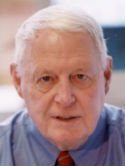| Abstract: |
Acute promyelocytic leukemia (APL) is a particularly virulent subtype of acute myeloid leukemia that is associated with a specific chromosomal translocation, t(15;17). Patients with APL are currently being managed with cytolytic chemotherapy (usually an anthracycline in combination with arabinosylcytosine), a treatment that can induce complete remissions in 65% or more of patients and probably cure 15% or more. Exciting new clinical observations have shown that patients with APL also respond extremely well to treatment with all-trans retinoic acid, an agent which induces the leukemic promyelocytes to undergo maturation and lose their ability to proliferate. Retinoic acid by itself is not curative, but by combining it with cytolytic chemotherapy, it may be possible to cure the majority of patients with this previously fatal leukemia. Interestingly, independent molecular studies have recently revealed that the breakpoint of t(15;17) lies within the gene encoding the retinoic acid receptor-α (RAR-α) on chromosome 17q21, and that patients with APL express aberrant forms of the RAR-α transcript. This convergence of clinical and molecular observations, though fortuitous, is extremely important because it represents the first example of a selective form of treatment for a human leukemia that is related to a specific genetic abnormality. |



